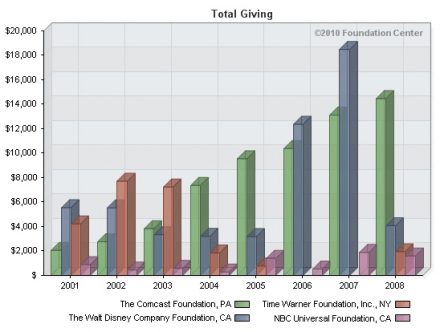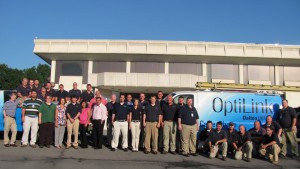
Bray Cary -- Frontier's biggest fan in West Virginia
Bray Cary has been falling all over himself again — singing praises for Frontier Communications while many of its customers in West Virginia contend with service problems and outages, sometimes for weeks at a time.
Cary, president and chief executive officer of West Virginia Media, owner of television stations across the state, was a big supporter of the deal to sell Verizon’s landlines in West Virginia to Frontier Communications. This past spring, Cary’s weekly Decision Makers program treated viewers to a softball question and answer session with Frontier’s Ken Arndt, who was forced to “endure” Cary’s contention that opposition to the deal was limited mostly to labor union sour grapes.
With a hard interview like that, Arndt was delighted to be asked back for another edition of Tea-’N-Cookies Breakfast Club With Bray, this time to answer tough questions about how the transition could have possibly gone any better for the independent phone company.
Good morning and welcome to Decision Makers on a weekend when America is discovering the beauty of the great state of West Virginia. Through the magic of worldwide television […] we here in West Virginia are on the verge of discovering the power of the Internet across all of our hills and all of our valleys.
With that over-the-top introduction, Cary was off, spending nearly 20 minutes glad-handing Arndt through an interview that could have been produced in-house by Frontier’s marketing department.
[flv width=”500″ height=”395″]http://www.phillipdampier.com/video/WTRF Wheeling Decision Makers Cary Arndt Frontier 7-31-10.flv[/flv]
Nearly 20 minutes of mutual admiration between Frontier’s Ken Arndt and WV Media’s Bray Cary can be experienced for yourself. These segments appeared July 31st on the Decision Makers program. (19 minutes)
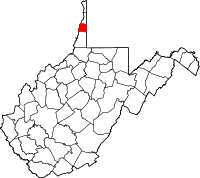
Ohio County, WV
More tea?
Meanwhile, in other parts of the state things are not nearly as rosy as Cary and Arndt contend.
Stop the Cap! reader Ralph points us to Ohio Country, located in the Northern Panhandle of West Virginia, where Frontier has subjected some customers to service outages extending into three weeks. Entire neighborhoods have lost phone and broadband service. Dela Misenhelder, who lives in Valley Grove says a storm August 4th knocked out service for her and her neighbors. Misenhelder used her cell phone to call Frontier three different times to no avail.
“My concern is the elderly,” Misenhelder told a local TV station. “Do they have cell phones — being out in the country, do they even have a signal — and be able to get 911 in case of an emergency or problem.”
Frontier’s regional general manager, William (Bill) Moon said that Frontier was supposed to have contacted all of the neighbors impacted by the outage to make sure service was restored. In Misenhelder’s case, since her phone line was still not working, she never got that call.
Moon is a name readers will become increasingly aware of, as he features prominently in damage control efforts by Frontier in northern West Virginia when they get negative media coverage.
[flv width=”640″ height=”380″]http://www.phillipdampier.com/video/WTOV Steubenville Frontier Continues Dealing With Phone Service Issues 8-25-10.flv[/flv]
Dela Misenhelder in Ohio County, W.V., was without her Frontier phone line for three weeks. She made three calls to Frontier, who ignored her, so Dela called the newsroom of local TV station WTOV-TV in Steubenville, Ohio looking for help. They achieved results for her, as you’ll see in this report. (2 minutes)
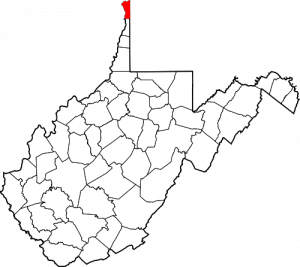
Hancock County, WV
Matters are even more serious in the northern tip of the state — in Hancock County — where emergency responders are coping with defective T1 data lines that Frontier has failed to maintain properly, causing interruptions in emergency radio traffic.
The problems started when Verizon was in charge, but have gotten considerably worse since Frontier arrived. Now the backup systems are beginning to fail as well.
When that happens, emergency communications with fire, police, and ambulance can’t happen, forcing first responders to rely on cell phones to communicate with one another.
Frontier called the problems with the T1 lines “odd” and at last check was examining more than 10,000 feet of phone cable looking for problems.
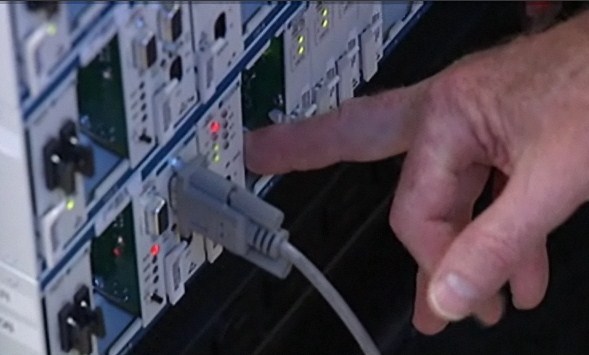
A local TV station witnessed the failure of a Frontier T1 line provided for emergency radio traffic themselves while filming a story on repeated Frontier outages.
On Saturday, another Frontier outage disrupted 911 service across Jefferson, Belmont and Harrison Counties, forcing local media to deliver streams of local direct numbers for emergency officials across all three counties.
[flv width=”640″ height=”380″]http://www.phillipdampier.com/video/WTOV Steubenville Hancock County Experiencing More Phone Problems 7-8-10.flv[/flv]
Not less than three reports about failures in emergency communications attributed to a defective T1 line maintained by Frontier Communications have run on WTOV-TV in the last two months. (6 minutes)
Residents in Marshall and Wetzell counties, which complete the Northern Panhandle are no strangers to Frontier service problems. They were Frontier customers before Verizon sold its landline network to the company.
Stop the Cap! reader Mitch in New Martinsville writes to tell us West Virginia is just becoming acquainted with service on ‘the Frontier.’
“The company delivered lousy service to us long before they’ll deliver lousy service to the rest of the state,” he writes. “We cannot get DSL from Frontier because they won’t spend the money to re-engineer the ancient wiring on our street.”
For Mitch, the outage experienced by his ailing grandmother this past February, which stopped calls connecting from outside of the 686 exchange, was the last straw.
“She couldn’t reach me and I couldn’t reach her,” Mitch adds. “If a phone company cannot even handle basic phone call connections, what good are they?”
[flv width=”640″ height=”380″]http://www.phillipdampier.com/video/WTOV Steubenville Phone Service Knocked Out In Parts Of Marshall Wetzel Counties 2-10-10.flv[/flv]
A winter storm knocked out Frontier service across parts of the Northern Panhandle this past February. Customers discovered they could only dial and receive calls from other local residents. WTOV-TV covered the story. (2 minutes)
When Mitch tried to cancel Frontier service, he says they tried to stick him with an early termination fee of more than $100.
“I never signed a contract with them,” he writes.
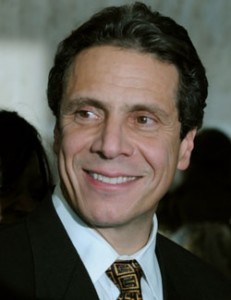
NY State Attorney General Andrew Cuomo
Mitch escalated his complaint to the West Virginia Public Service Commission, which finally got Frontier to relent.
Mitch’s experience with phantom early termination fees charged by Frontier are hardly new. Last fall, Frontier was slapped with a $35,000 fine and ordered to refund $50,000 in wrongfully charged termination fees by the NY State Attorney General’s office.
That precedent might come in handy in Washington state, where Frontier “accidentally” put former Verizon customer Steve Matheny in Redmond on an annual contract with a hefty cancellation fee. When Frontier took over for Verizon, Matheny decided it was time to drop service. Frontier sent him a final bill including a fee of $120 for terminating his service before his contract had ended.
Only one problem — he never had a contract.
“These folks rolled in and added a fee that no one committed to, at least I didn’t commit to,” he said.
Frontier ignored Matheny’s attempts to get the fee off his final bill, so he called KING-TV in Seattle for help.
As with so many other cases, when local TV stations feature Frontier’s mistakes and bad service on the 6 o’clock evening news, doors to a speedy resolution have a tendency to open. Matheny got his $120 “fee” removed.
[flv width=”480″ height=”290″]http://www.phillipdampier.com/video/KING Seattle Bundled by accident charged a fee 8-24-10.mp4[/flv]
Redmond, Washington resident Steve Matheny joins a growing number of Frontier customers who suddenly find themselves on annual service contracts with hefty cancellation fees, despite the fact they never agreed to them. KING-TV reports their intervention finally cut through Frontier’s red tape to get $120 in early cancellation fees removed from a final bill. (2 minutes)
For West Virginia residents, the next time you experience a problem with your Frontier landline or broadband service, why not contact Bray Cary and ask him what he’ll do about it. At the very least, ask him to pass you the plate of cookies.
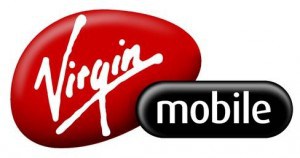 Last week, Stop the Cap! took a look at Virgin Mobile’s new unlimited $40 prepaid wireless broadband service. Early testing looked promising, with speed test results that were well within economy tier DSL service and better than expected. But by early this week the story began to change.
Last week, Stop the Cap! took a look at Virgin Mobile’s new unlimited $40 prepaid wireless broadband service. Early testing looked promising, with speed test results that were well within economy tier DSL service and better than expected. But by early this week the story began to change.

 Subscribe
Subscribe